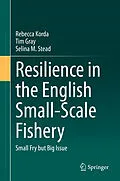Dr. Tim Gray is Emeritus Professor of Political Thought employed as a Senior Research Investigator by Newcastle University in the Politics division of the School of Geography, Politics and Sociology to carry out research and doctoral supervision. He has authored/co-authored 5 books and 13 articles/chapters on political thought, and authored/co-authored/edited 9 books and 53 articles/chapters on environmental politics. The topics of the latter include temperate and tropical fisheries management, fisheries-dependent communities, stakeholder participation in fisheries governance, coral reef fisheries management, and governance of marine protected areas.
Professor Selina Stead is the Head of the Institute of Aquaculture at the University of Stirling and the UK Government's Chief Scientific Advisor for the Marine Management Organisation. In March 2019, she moved from Newcastle University, where she served as Dean of Research and as Public Orator. A zoologist by training, Professor Stead received a joint honours BSc in Marine Biology and Oceanography from Bangor University, Wales. She then graduated with an MSc in Fisheries Biology and Management, and subsequently a PhD in Zoology from Aberdeen University. Professor Stead's research specialises in international marine food security with a particular emphasis on fisheries and aquaculture. She has published widely on marine science policy, coastal governance, biodiversity conservation and marine protected areas. Stead has held several high-profile positions, including President of the European Aquaculture Society, Chair of the Scottish Government's Marine Science Advisory Board and Ministerial Appointed Scientific Advisor to the North Eastern Sea Fisheries Committee. Professor Stead's work has been recognised through the awarding of prizes such as the European Aquaculture Society's highest honour, the Distinguished Services Award for research towards balancing global food security and biodiversity conservation - using open innovation and systems thinking - to achieve the United Nation's Sustainable Development Goals
Autorentext
Dr. Tim Gray is Emeritus Professor of Political Thought employed as a Senior Research Investigator by Newcastle University in the Politics division of the School of Geography, Politics and Sociology to carry out research and doctoral supervision. He has authored/co-authored 5 books and 13 articles/chapters on political thought, and authored/co-authored/edited 9 books and 53 articles/chapters on environmental politics. The topics of the latter include temperate and tropical fisheries management, fisheries-dependent communities, stakeholder participation in fisheries governance, coral reef fisheries management, and governance of marine protected areas.
Professor Selina Stead is the Head of the Institute of Aquaculture at the University of Stirling and the UK Government's Chief Scientific Advisor for the Marine Management Organisation. In March 2019, she moved from Newcastle University, where she served as Dean of Research and as Public Orator. A zoologist by training, Professor Stead received a joint honours BSc in Marine Biology and Oceanography from Bangor University, Wales. She then graduated with an MSc in Fisheries Biology and Management, and subsequently a PhD in Zoology from Aberdeen University. Professor Stead's research specialises in international marine food security with a particular emphasis on fisheries and aquaculture. She has published widely on marine science policy, coastal governance, biodiversity conservation and marine protected areas. Stead has held several high-profile positions, including President of the European Aquaculture Society, Chair of the Scottish Government's Marine Science Advisory Board and Ministerial Appointed Scientific Advisor to the North Eastern Sea Fisheries Committee. Professor Stead's work has been recognised through the awarding of prizes such as the European Aquaculture Society's highest honour, the Distinguished Services Award for research towards balancing global food security and biodiversity conservation - using open innovation and systems thinking - to achieve the United Nation's Sustainable Development Goals
Inhalt
